The Friday Edition
Our Friday News Analysis | What the World Reads Now!
Helping to Heal a Broken Humanity (Part 24)
The Hague, 14 February 2025 | If you know of a decisive story, tell the world! We're still searching.
EDITORIAL | Why Do So Many Fall for Make-Believe – Fantasies, Illusions, Trickeries?

Are we naïve or just plain suckers? Could it be that we’re a little too trusting or too gullible?
By Abraham A. van Kempen
14 February 2025
“Anarchy is the Stepping Stone to Absolute Power.
In Politics Stupidity is Not a Handicap.
If You Wish to Be a Success in the World, Promise Everything, Deliver Nothing.
History is a Set of Lies Agreed Upon.
Four Hostile Newspapers Are More to Be Feared Than a Thousand Bayonets.”
__ Napoleon Bonaparte (1769-1821)
I don’t know anyone who wants someone to “pull the wool over their eyes," which the Cambridge dictionary defines as "to deceive someone to prevent them from discovering something.”
Who hasn’t felt trapped at some point? How can someone created in God’s image be so blind? Being called a ‘freier’ or sucker in Israel—a term borrowed from Yiddish— is one of the worst insults, nearly akin to blood libel. However, I’m not aware of any other nation primarily populated by suckers. Forty percent of them believe they are God’s exclusive chosen and allow a minority of those who kill and get killed to tyrannize the majority who prefer to live and let live. Almost all of them tend to hide the countless possibilities for change beneath the sand. They are still stuck in their ruts.
Manufacturing Consent
I met an account executive on Madison Avenue in New York years ago. The term "Madison Avenue" is frequently used to refer to the American advertising industry, gaining this association following its expansion in the 1920s.
In response to my question, “Why do individuals fall for illusions, purchasing items they may not desire, don’t require, and will rarely use or wear?"
The advertising executive claimed, “People naturally seek trust; we are genetically predisposed to believe in the impossible.”
“Are we so easily influenced, swayed, orchestrated, socially engineered, and controlled?”
"Absolutely!" he replied with glee.
Now I realize the manufacturing of consent isn’t so complex. It only takes $ billions.
Powerful lobbying groups and dedicated, passionate political action committees usually have good intentions, but power often corrupts, and absolute power corrupts absolutely.
They fervently believe their way is the best and everyone should follow it. With money everything is possible.
Well-financed public opinion leaders – movers and shakers –including government agencies, can fund university chair positions to produce academic reviews published in peer-reviewed journals. Equipped with academic credibility and legitimacy, they distill their policies into clear talking points for distribution as press releases to media organizations. In the worst-case scenario, these media outlets are financially incentivized to support the interests of the most powerful lobbying groups.
From there, it becomes a circus with talk show interviews, speeches to mobilize the rich and famous at influential gatherings, such as The Economic Forum in Davos, Switzerland, and hometown rallies designed to galvanize the average Joe and Jane. Most lobbyists and political action committees publish their in-house periodicals. The Council on Foreign Relations publishes ‘Foreign Affairs,’ which is required for anyone in international relations and foreign affairs – required reading for every ambassador and embassy staff worldwide.
A minority with power often exploits a majority of fools.
Happy Valentine’s Day
Not having a clear direction can leave us feeling a bit lost and unhappy.
THE U.S. ECONOMY IS RACING AHEAD. ALMOST EVERYTHING ELSE IS FALLING BEHIND.
The gap between Americans’ prosperity and quality of life has grown since the 1990s
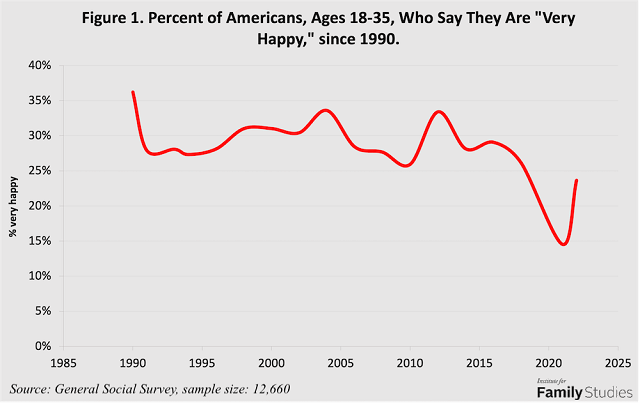
Institute for Family Studies
Young Adult Happiness From 1990 to 2022
In recent decades, the American economy has outpaced all other high-income economies in growth.
Currently, the U.S. is the second-largest economy globally, following China.
However, when considering other indicators of well-being, particularly health and happiness, the U.S. performs worse than several other wealthy nations and has further lagged since the 1990s.
By David Leonhardt
Graphics by Ashley Wu
New York Times
4 February 2025
.png)
Total G.D.P.


A diverse group of scholars—who have advised every president since Bill Clinton and work at top think tanks—released a report card on American well-being. After months of debate, they agreed on 37 metrics to track, comparing the U.S.'s economic performance, health, social trust, and more with those of other countries since the 1990s.
The group’s main finding is that the U.S. economy surpasses most competitors in productivity and innovation, but this has not significantly improved living standards for most Americans.
"Despite our wealth, we remain unhappy,” said Bradley Birzer, a professor of history, at Hillsdale College in Michigan. "This seems to be the central issue of modernity.” Heidi Shierholz, president of the Economic Policy Institute in Washington, added: "As the wealthiest nation, we struggle to achieve widespread economic prosperity and security.”
U.S. economic growth has outperformed that of other high-income countries. In 1990, the per capita GDP was 28% higher than that of the euro area; this gap has since widened to over 80%.
However, comparisons in many other areas paint a much less favorable picture of the U.S.
This country now has the lowest life expectancy among wealthy nations, a shift from most of the 20th century. The U.S. leads in murder rates and fatal drug overdoses among rich countries. Trust in the federal government is low, alongside high rates of youth depression and single-parent families. Americans' life satisfaction ranks lower than three decades ago.
The committee failed to explain trends or propose solutions. Disagreements arose from member diversity. However, The New York Times invited all 14 members to share perspectives, revealing five key themes.
1. Overall GDP
Government policy and American culture emphasize economic growth. Taxes are low for the affluent. Americans work long hours and embrace risk-taking. The U.S. also has a strong venture-capital sector.
.jpg)
The U.S. Economy Is Racing Ahead. Almost Everything Else Is Falling Behind. - The New York Times
The U.S. is less attentive to public health. "For a long time, the United States has prioritized economic growth," said Patrick Sharkey, a Princeton sociologist. He pointed to high murder rates from lax gun laws and poverty. In contrast, many countries have much lower rates. The U.S. tolerates this high rate.
University of Chicago economist Ariel Kalil noted that happiness and well-being are often less linked to economic conditions than many think.

2. ‘Pulling apart’
Researchers commonly mention social isolation.
Participation in group activities like sports leagues, union meetings, or church events is declining in the U.S. Teenagers socialize less, and adults and children spend hours on their phones, often with headphones. The COVID-19 pandemic worsened isolation, and many social habits, such as office work or dining out, haven't returned to pre-pandemic levels. Additionally, political polarization heightens discomfort among neighbors with differing views.

Douglas Harris, an economist at Tulane University, stated, "The main theme is fragmentation—economically, socially, and politically." Frederick Hess, from the American Enterprise Institute, noted that the gap between G.D.P. and other metrics arises from diminishing community ties and Americans' feeling less anchored in faith and family connections.

3. Inequality
Although the report presents many measures as average outcomes, the considerable inequality in the United States distorts these averages, not truly capturing the typical person’s experience. Joseph Romm of the University of Pennsylvania observed, "The robust economic performance has primarily favored the top 10 percent."
Economist Gary Hoover says that many individuals face slow progress despite a booming economy, leading to personal blame for their lack of success. Carol Graham from the Brookings Institution notes that many have “lost their life narratives.”
4. Affluence itself
Scott Winship from the American Enterprise Institute stated, "Many of our challenges stem from our wealth." Excess food causes obesity, and higher incomes enable smartphone purchases that can foster isolation. Increased wealth also lessens dependence on friends, family, or spouses.
“Our brains evolved in a time of scarcity, making today's abundance misaligned with our wiring," said Anna Lembke, a Stanford psychiatrist. "With more potency, accessibility, and novelty, we often overconsume, resulting in sickness."
5. Bad luck
Michael Strain from the American Enterprise Institute argued that Americans' negative views contradict the country’s resilience. He believes many major issues will soon be resolved. He remarked, “The U.S. has faced a century-scale financial crisis, a pandemic, and recent inflation. These challenges will impact national sentiment.”
If correct, national mood may improve, but most panel scholars are less optimistic.
________________________________________
The report ranks the G.D.P. using purchasing power parity. Other G.D.P. rankings still show the U.S. as the leader and China as the second.
All charts show rankings among China and 38 OECD countries for each metric for which data is available. However, not all countries have data for all years.
Details for each metric are in the authors’ full report.
________________________________________
David Leonhardt runs The Morning, The Times’s flagship daily newsletter. Since joining The Times in 1999, he has been an economics columnist, opinion columnist, head of the Washington bureau and founding editor of the Upshot section. More about David Leonhardt
Ashley Wu, a graphics reporter for The Times, uses data and visuals to help explain complex topics. More about Ashley Wu
ON "INTERNEWS" (IN)
A big rock overturned.
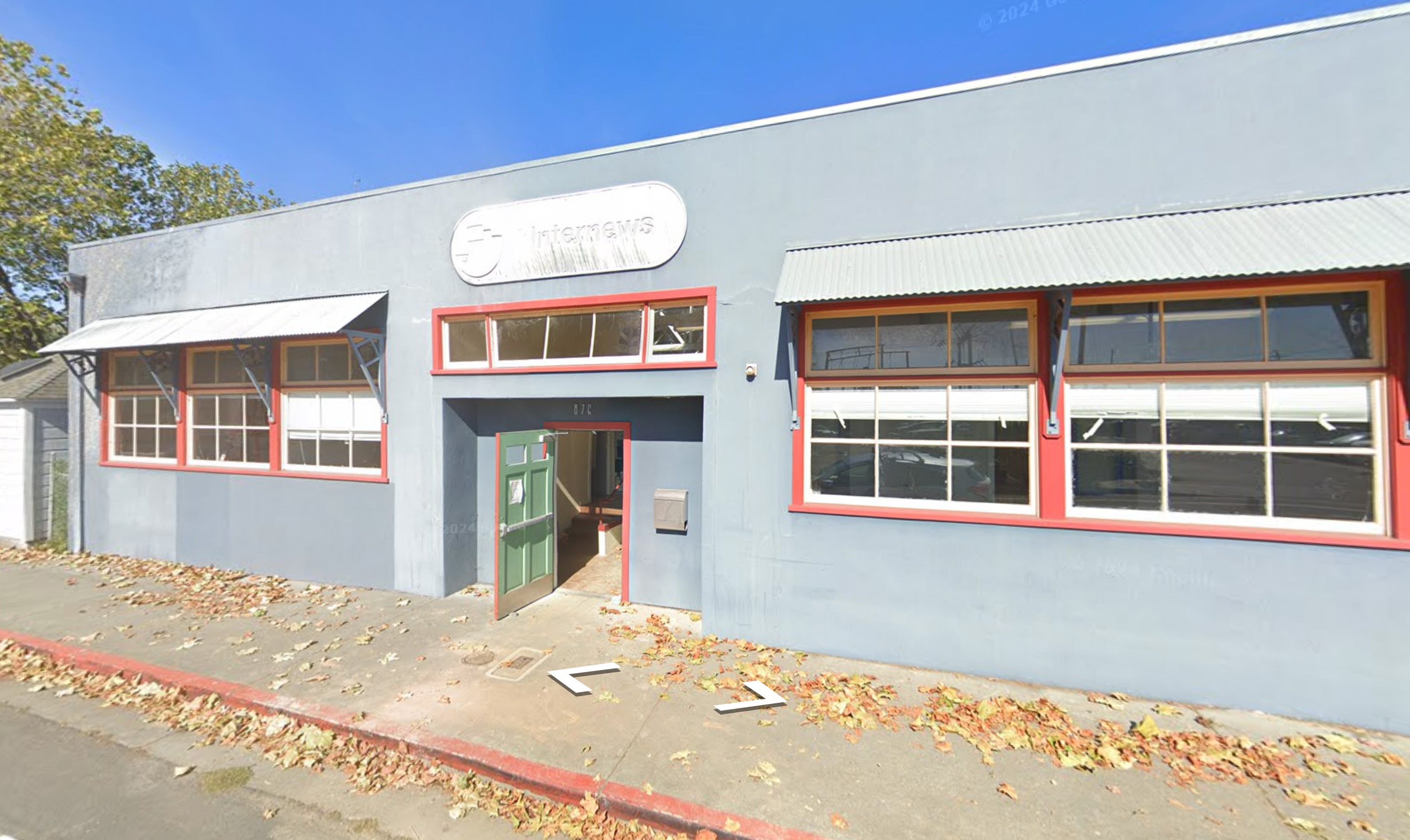
876 7th St, Arcata, CA
By Matt Taibbi
Substack.com
8 February 2025
From Wikileaks last night:
USAID has funneled $472.6 million to the NGO Internews Network (IN),
which collaborates with 4,291 media outlets and produces 4,799 broadcast hours annually.
It reaches 778 million people and trains over 9,000 journalists (2023).
IN also backs social media censorship initiatives.
Imagine stumbling upon a large piece of plywood resting in a field or a junkyard! Sometimes you lift it and find just a bit of dirt underneath, while other times, you might uncover a wriggly surprise, like snakes and maggots.
How intriguing is that?
Please bear with me on Internews. This one’s going to take a minute.
US TAX DOLLARS FUELING UKRAINIAN ELITES’ LAVISH LIFESTYLES – TUCKER CARLSON
Ukrainians are Europe's "richest people," spending lavishly in resort towns, claims the American journalist.
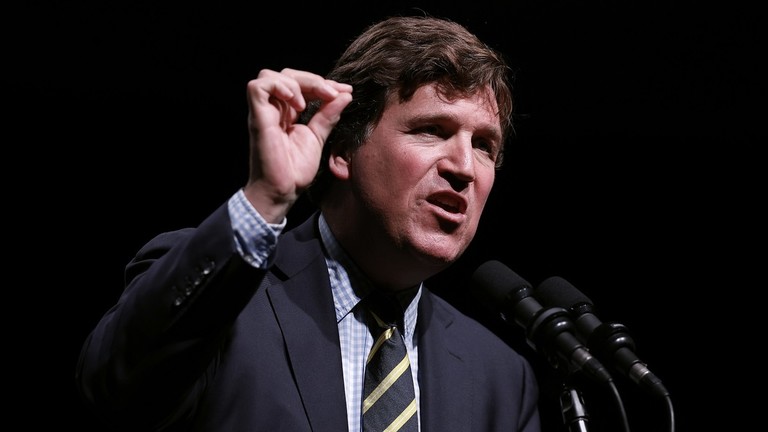
FILE PHOTO: US talk show host Tucker Carlson. © Chip Somodevilla / Getty Images
HomeWorld News
11 February 2025
Ukrainian elites have profited from US taxpayer money intended for the conflict with Russia, claims journalist Tucker Carlson. He noted wealthy visitors at a ski resort in an interview with retired US Army Lieutenant Colonel Daniel Davis.
Carlson, a former Fox News host opposed to US support for Ukraine, described visiting an expensive Alps resort where he found that "the whole town is Ukrainian.”
“All visitors are Ukrainian, spending millions in Hermes each afternoon. The richest in Europe are Ukrainians,” he noted, saying their money “belongs to every American taxpayer.”
Carlson stated that Ukrainian corruption wastes American resources and endangers US citizens.
He cited allegations of Ukrainian military selling weapons to Mexican drug cartels.
He claimed to know this as fact but provided no evidence. He condemned US financial support for Ukrainian services, accusing them of planning "terrorist attacks" in Russia.
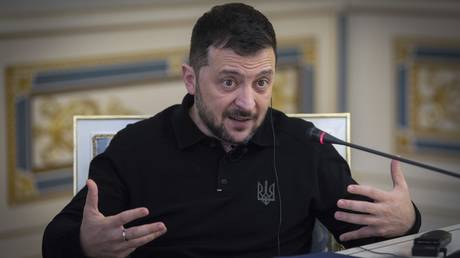
Read more
Zelensky can’t account for more than $100 billion in claimed US aid.
"Anyone wanting to know knows," Carlson said, accusing media and Biden administration officials of covering up for Kiev.
The contrast between assistance for Ukraine and the wealth of some Ukrainians in the EU has caused resentment in countries like Poland, which has taken in nearly a million Ukrainian refugees since 2022. In a recent interview, Polish Defense Minister Wladyslaw Kosiniak-Kamysz stated that Poles are shocked by "young Ukrainian men driving luxury cars and staying in five-star hotels.”
Polls indicate a shift in public sentiment against Ukrainians.
THE BIGGEST, MOST CORRUPT NEWS ORGANIZATION YOU HAVE NEVER HEARD OF
The Organized Crime and Corruption Reporting Project (OCCRP)
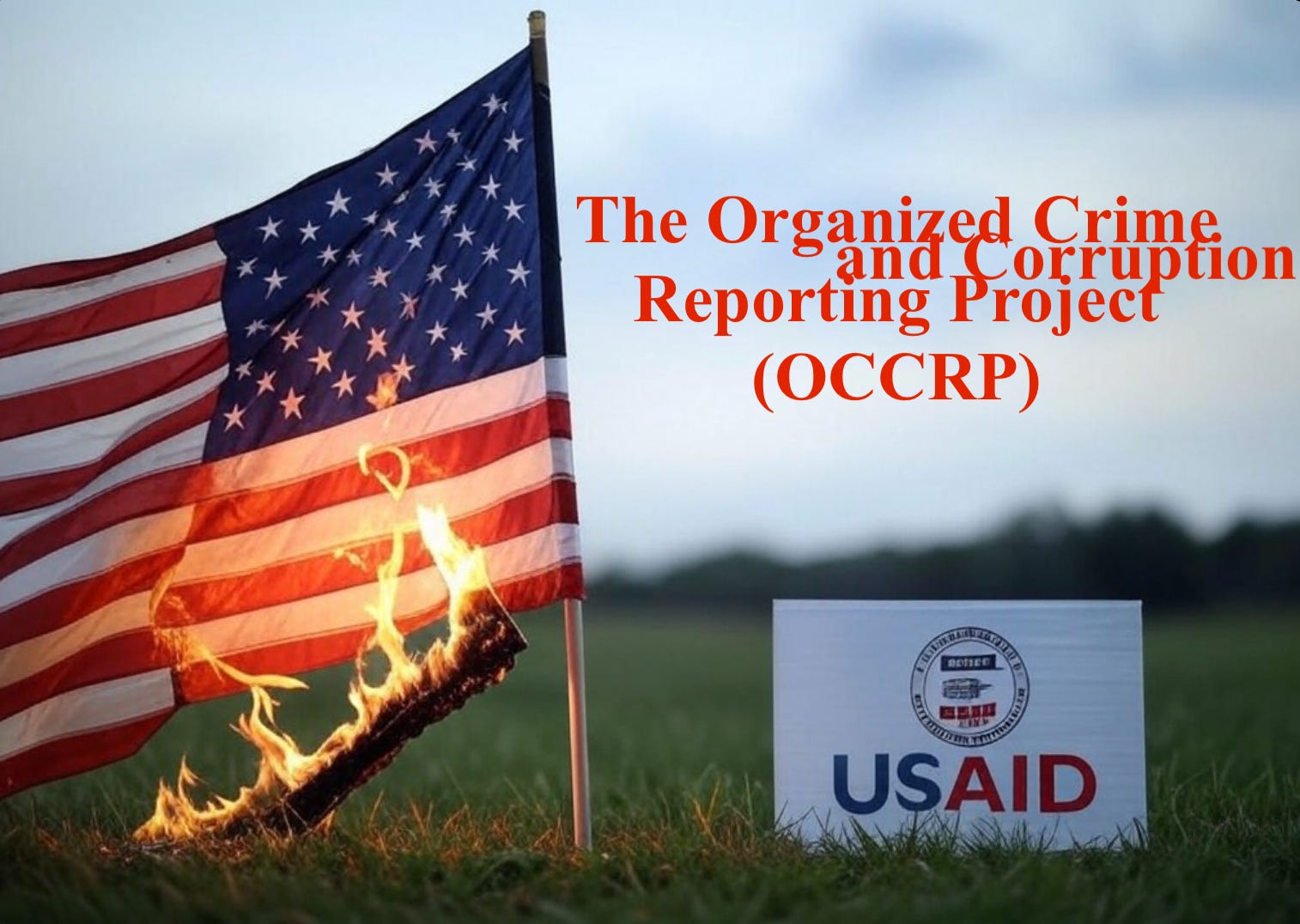
By Robert W Malone Md, Ms
Substack.com
8 February 2025
What if you knew there was an organization, the Organized Crime and Corruption Reporting Project (OCCRP), claiming to be one of the largest news organizations, with 200 staff and partnerships with over 50 media outlets worldwide? Its mission is to instigate regime change in countries deemed hostile to the United States.
“OCCRP is a major investigative journalism organization based in Amsterdam,
with staff on six continents.
We are a nonprofit newsroom partnering with media outlets to publish impactful stories.”
The Organized Crime Reporting Project (OCCRP)
How is this done? With a $23 million annual budget, OCCRP uses its resources to investigate individuals and governments in nations hostile to U.S. interests. Based on its findings, OCCRP collaborates with the Global Anti-Corruption Consortium (GACC) to initiate criminal investigations or sanctions. Finally, OCCRP partners with "Transparency International (TI)" to create initiatives for regime change.
The Organized Crime and Corruption Reporting Project (OCCRP) is a global collective of investigative journalists founded in 2006. USAID and the Soros Foundation are the main ones that fund it. The project aims to expose international corruption and organized crime, focusing on offshore activities published in local media. Its goal seems to influence political movements in countries not aligned with US interests without their awareness of US involvement.
OCCRP shares investigative stories via local media and its site. It conducts 60 cross-border investigations yearly and trains journalists in reporting. OCCRP also creates tools to enhance reporting efficiency.
In 2017, OCCRP was ranked 69th globally by “NGO Advisor” among top 500 NGOs.
USAID’s involvement in OCCRP
The Organized Crime and Corruption Reporting Project (OCCRP) has a notable partnership with the US Agency for International Development (USAID), fostering essential collaboration.
- OCCRP received 52% of its funding from the US government from 2014 to 2023.
- OCCRP's Independence: OCCRP claims independence but relies on the US government for its structure.
- USAID has veto power in selecting key personnel and directs the organization's annual work plan. Some critics have dubbed USAID "the new CIA," expressing worries over its intimate role in OCCRP activities.
- Investigative Focus: OCCRP primarily targets foreign governments and entities threatening American interests, rarely examining its allies.
- OCCRP is a founding partner of the Global Anti-Corruption Consortium (GACC), aiming to instigate criminal investigations or sanctions from its articles.
- The U.S. government is the leading financial supporter of GACC, having invested $10.8 million via USAID. Additionally, a significant contributor is the Open Society Foundations (OSF), established by George Soros, which has granted funds to OCCRP, a crucial ally in GACC.
- OCCRP partners with Transparency International (TI), which Michael Hershman, a former U.S. military intelligence officer, founded. Hershman also directs the Centre for International Private Enterprise, heads FBI informant recruitment, and manages the private intelligence firm Fairfax Group.
- Transparency International is viewed as a CIA front for economic intelligence and a media tool urging countries to revise laws for open markets. Wikispooks claims it facilitates US regime change efforts.
- Transparency International is funded by the US State Department, the European Commission, the National Endowment for Democracy, Britain’s Department for International Development, and the Open Society Foundations.
- OCCRP functions as a US propaganda tool, influencing other countries to change their laws and driving regime change within non-aligned nations.
- OCCRP has expanded its focus from persecuting hostile entities and governments to influencing elections of U.S. allies.
AMERICAN CENSORSHIP INTENSIFIES IN THE INFORMATION WAR
Some reflections after being canceled/banned by YouTube

Click Here to Watch Video (2 minutes, 6 seconds)
By Prof. Glenn Diesen
Substack.com
5 October 2024
Global reports show the US is ramping up its censorship efforts. It has seized Iranian media domains, banned Russian outlets, invested billions to undermine China in international media, forced TikTok to consider selling or banning itself, pressured Al Jazeera, banned Africa Stream, and is urging countries to align with its censorship policies.
Larger countries like India resist US pressure, but smaller nations seem to yield to the escalating demands in the information war. Government-funded NGOs established under the Reagan doctrine manipulate civil society for the intelligence community, contributing to censorship. Digital platforms face intense pressure to comply with US government censorship. A US House Judiciary Committee report revealed the Biden administration coerces Big Tech firms like Facebook, Google, and Amazon [1] into censoring content. Mark Zuckerberg regretted Facebook’s compliance, but his statements suggest a lip service to free speech as censorship remains pervasive.
A few weeks ago, I learned that YouTube deleted large accounts criticizing US and NATO wars. I managed to leave YouTube before that happened. This cancellation reminded me of Orwell’s thoughtcrime: I received an automated email stating that their AI detected “hate speech,” leading to the deletion of my account. There were no examples, evidence, or warnings. I complained, finding it absurd to censor an academic on such a bizarre accusation, but I only got another automated rejection.
As a political science professor, I used my channel to interview top academics, economists, military leaders, politicians, and even a president. My goal was to facilitate discussions with critical voices primarily ignored by the media due to conflicting narratives. Viewers know I avoid hate speech, though control is often disguised as compassion.
How did we reach this point? How did the US abandon free speech, a sacred principle and cornerstone of its identity?
Incrementalism: Normalizing Censorship and Cancellation
Censorship normalization occurred gradually to reduce opposition, like slowly boiling a frog. Incrementalism or salami tactics involve small steps to lessen public scrutiny.
- The first step in normalizing censorship and cancellation involves a minor, justified case framed as public protection rather than oppression.
- To secure public support, moral or security concerns must justify initial censorship, and it must focus on a widely disliked fringe group. At first, the government avoids direct participation, instead showing a measured acknowledgment of censorship using terms like “content moderation” or “de-platforming."
- Vague terms like “hate speech” and “propaganda” justify censorship, as they lack precise definitions, allowing for selective criminalization of speech.
- Intelligence agencies and media support are crucial to redefine free speech as a privilege.
- Gradually, the public normalizes censorship, eliminating the need for justification.
Trump's unexpected 2016 election win and the rise of fake news incited public panic, increasing acceptance of censorship. Alex Jones's 2018 de-platforming normalized excluding individuals from public discourse. His claim that Sandy Hook parents were actors fueled arguments for censorship, seen as an exception to free speech, rather than a precedent for broader restrictions.
Incrementalism arose from the de-platforming of fringe figure Alex Jones, who sparked controversy. However, by January 2021, Twitter had de-platformed the sitting U.S. president. The Washington Post identified 200 websites, including Antiwar.com, WikiLeaks, and the Ron Paul Institute, as “routine peddlers of Russian propaganda.”
This blacklist primarily defined Russian propaganda as criticism of mainstream media, NATO, the EU, and prominent figures like Obama, Clinton, and Merkel. Google utilized these blacklists to modify its algorithms, while YouTube demonetized several sites. This served as a warning to journalists and news sites: self-censor or face censorship.
Digital platforms face diminishing pressure to justify their actions. Now, opponents of censorship must explain themselves.
THE MEDIA IS BUSTED
And will soon die.
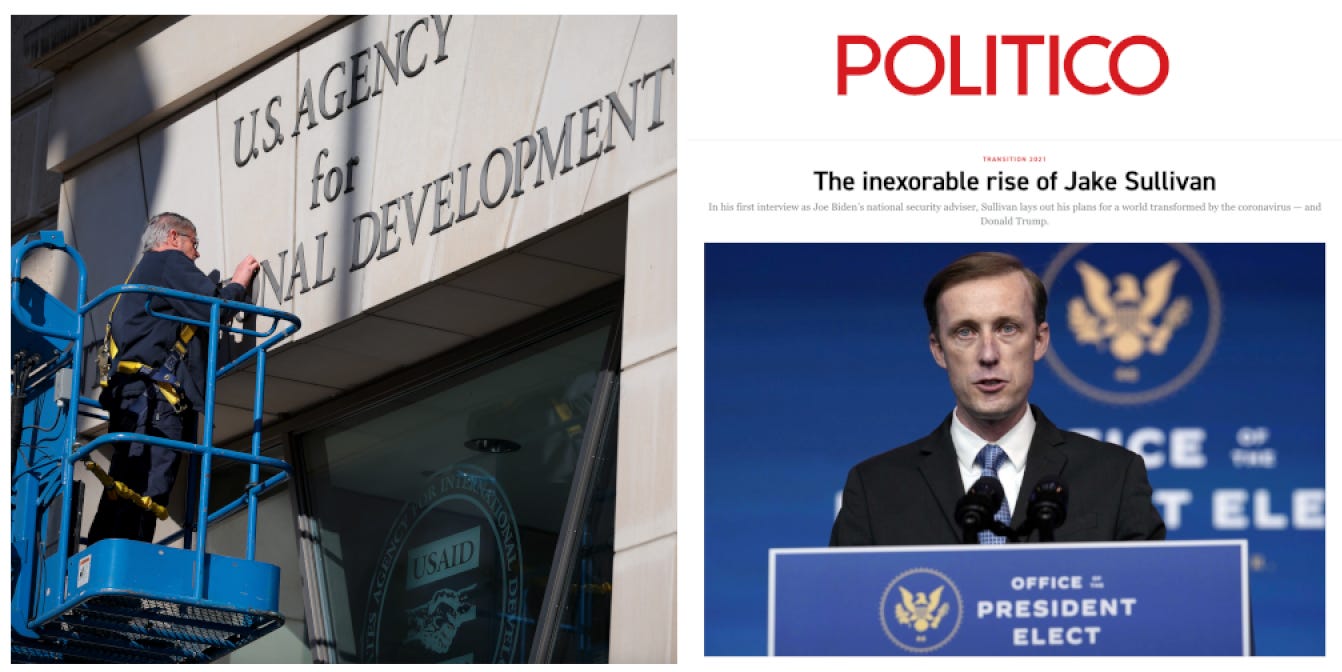
By Matt Taibbi
Substack.com
8 February 2025
From the New York Post:
On Wednesday, the White House revealed that federal agencies are taking steps to terminate expensive contracts with Politico. This decision comes after Elon Musk labeled these contracts as a "wasteful" use of taxpayer dollars under the Department of Government Efficiency's cost-reduction initiative. For the year ending September 30, 2024, about $8.4 million of taxpayer money had been allocated to Politico.
I delayed writing about the media payoffs because I feared overexposure. My sense of betrayal is immense. I’ve spent years watching the industry violate its rules and ruin its best people, many of whom are friends or mentors. Now, those who smeared are playing the victim at a critical moment.
It’s the last straw. The legacy press needs to be put out of its misery:
Some are ignoring the story, while others are trying to downplay the issue. Editor-in-Chief John Harris’s note mirrors recent statements from Newsguard and Stanford’s Internet Observatory, which claimed, "We do not receive any government funding." Although they have substantial contracts from the Department of Defense (DoD or the National Science Foundation), they argue that this isn’t the same as receiving money. Politico emphasized:
"We have never received any government funding — no subsidies, no grants, no handouts,” Harris stated, noting that while government agencies subscribe, “this is not funding. It is a transaction.”
A transaction! It's insulting to think you'd take this seriously, as if audiences are naive. Like the Reuters headline, “News Organizations Reject Trump Accusations of a USAID Media Payoff.”
Media Rejects Criticism of Media. Hot off the presses, Criticism. They denounce claims by President Trump and right-wing influencers that the U.S. Agency for International Development funded newsrooms for favorable Democratic coverage.
It’s not just right-wing influencers; people across the spectrum are disgusted. No one can substantiate that millions in fees were made in exchange for coverage. The money speaks for itself. A Reuters reporter should know that if your bottom line relies on ongoing payments for an overpriced product only institutions can afford, you’re in a particular business. This issue highlights that these cash cushions are just the latest data points revealing the legacy press as a small part of an endless information operation, creating manufactured political narratives.
WHY TRUMP’S ASSAULT ON USAID COULD CHANGE US FOREIGN POLICY FOREVER
The president’s offensive against America’s ‘state within a state’ marks the end of an era
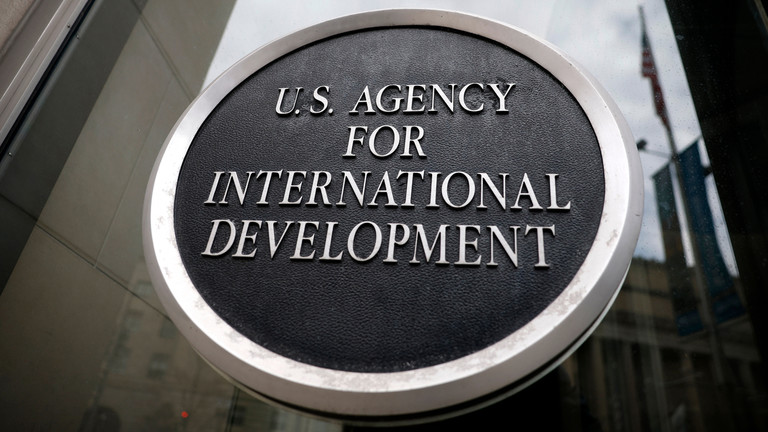
FILE PHOTO. © Kevin Dietsch/Getty Images
By Timofey Bordachev
Programme Director of the Valdai Club
HomeWorld News
7 Feb, 2025 09:43
For decades, USAID has been essential to American foreign policy, rivaling the influence of the Department of Defense and the State Department. USAID has advanced Washington’s global agenda, but the Trump administration's recent reforms indicate a shift, presenting challenges and opportunities for Russia.
USAID’s role in American foreign policy
USAID emerged in the early Cold War, when the United States recognized its inability to confront the Soviet Union militarily. Rather than engage in direct conflict, it chose a path of peaceful competition. In contrast to the USSR's aim to uplift the living standards of ordinary citizens in developing countries, the US prioritized manipulating elites and key influencers. This fundamental ideological difference between the superpowers shaped their foreign policy strategies.
With significant financial backing—around $40 billion last year—USAID has been the primary tool for US involvement in other countries' internal affairs. Its primary objective has been to incentivize elite individuals to align with American interests systematically. This approach has been utilized throughout Latin America, Asia, the Arab world, and, most recently, the former Soviet Union and Eastern Europe.
USAID: An instrument of destabilization
Instead of fostering stability or growth, USAID’s actions frequently result in internal turmoil and can even lead to a breakdown of statehood. Ukraine exemplifies this situation, as the agency’s participation has exacerbated political and social strife. Additionally, while infrequent, there are times when USAID has supported regimes that extend unique benefits to the US.
The agency’s operations do not seek to enhance the United States’ international appeal. Often idealized in academia, soft power does not arise from foreign policy strategies but from a nation’s inherent allure. The US attracts some people due to its lifestyle of selfishness and individualism rather than its diplomatic or military efforts.
Trump’s offensive: Reshaping USAID
The Trump administration’s USAID reforms aim to curb its unchecked power through personnel reshuffling, increased diplomatic oversight, budget cuts, and the appointment of loyal officials. This effort seeks to reassert control over a bureaucracy that has become too independent rather than end US interference abroad, which is vital for maintaining global dominance.
Trump disdains the agency because of its inefficiency and bloated structure. He prioritizes its survival over achieving meaningful foreign policy results. Permitting such an autonomous structure is unacceptable for a leader as authoritarian as Trump. All successes must be directly linked to his leadership and energy.
Panama: A case study in simplicity
A recent example of this approach is Panama. The Trump administration launched a diplomatic offensive against the Panamanian government, pressuring it to stop cooperating with China. Without elaborate schemes or massive expenditures, the US has secured control over the Panama Canal’s logistics. This success raises an important question: if political pressure works, why waste billions bribing elites?
Implications for Russia
These developments provide strategic advantages and lessons for Russia. However, the US’s internal divisions resulting from these reforms will limit foreign policy options. A temporary funding suspension for USAID will confuse grant recipients, undermining their confidence in Washington’s support.
Washington's changes stress avoiding the pitfalls of copying Western methods. Russia should be cautious about adapting American tactics. As the US demonstrated in Panama, traditional approaches often yield better results than overly complex schemes.
The legacy of USAID
USAID’s history involves political manipulation. Initially, it recruited elites and intellectuals in Latin America, Asia, and the Arab world. After the Cold War, it expanded to include officials, law enforcement, and activists in the former Soviet Union and Eastern Europe. Recently, it has intensified efforts in the Transcaucasus and Central Asia, seeking to destabilize these regions due to Russia’s military operation in Ukraine.
USAID has struggled to establish enduring stability and prosperity in its targeted regions despite its significant financial resources and influence. Instead, its initiatives frequently intensify tensions and conflicts, functioning more to promote American dominance than as a catalyst for authentic development.
The way forward
The Trump administration’s actions against USAID indicate a shift in US foreign policy while exposing the American model’s limitations. Relying on bribery and coercion for influence is unsustainable. This strengthens Russia’s foreign policy through mutual respect and genuine cooperation.
As the United States navigates internal strife and reassesses its global role, Russia must safeguard its interests and remain vigilant against actions that may threaten its neighboring nations. The lessons learned from the challenges faced by USAID are clear: genuine influence originates from cultivating true partnerships rather than through coercive tactics.
To conclude, the Trump administration’s "riot" at USAID is unlikely to change America’s interventionist habits radically, yet it reveals the weaknesses within its foreign policy system. This situation presents a challenge and an opportunity for Russia to undermine American influence while pursuing a more effective and principled approach to global issues.
This article originally appeared in the ‘Vzglyad’ newspaper and has since been translated and edited by the RT team.
‘THIS IS BLACKMAIL’: HOW THE WEST USED A HUMANITARIAN CRISIS TO PRESSURE A RUSSIAN ALLY
Although the energy crisis in Transnistria appears to be over, the underlying tensions that caused it are far from resolved.
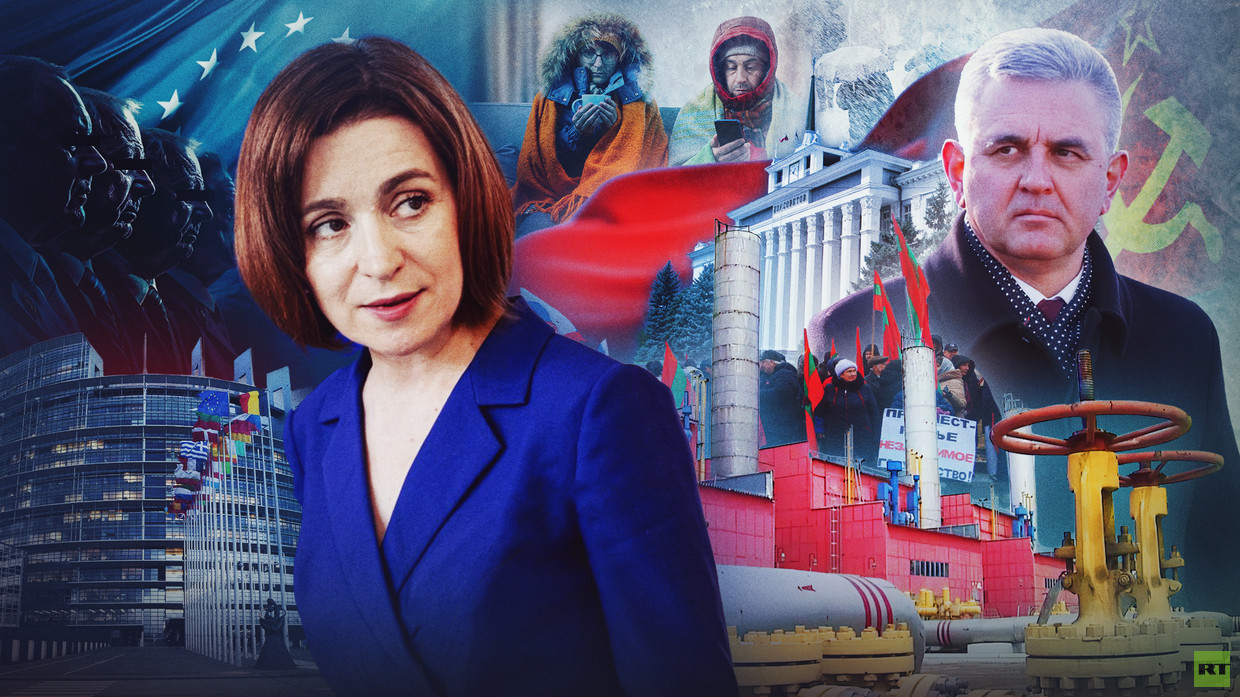
© RT / RT
By Petr Lavrenin
Odessa-born journalist and expert on Ukraine and the former Soviet Union
HomeWorld News
11 February 2025
Ukraine's halt of Russian gas transit to Europe has caused a humanitarian crisis in the unrecognized Pridnestrovian Moldavian Republic. For over a month, residents have lacked heating amid freezing temperatures as Moldova, Ukraine, and the EU used the crisis for political leverage. Russia played a role in resolving the situation, but Transnistria had to concede to Moldova for relief.
A Month Without Heat
Since January 1, Transnistria stopped receiving Russian gas, which had previously been free. This caused an unprecedented energy collapse—centralized heating in homes, schools, and universities ceased. Electricity became intermittent, and most businesses closed, leaving only food production active.
Anatoly Dirun, head of the Tiraspol School of Political Studies, stated:
"The situation is catastrophic; we haven’t seen anything like this since the 1992 war,” referring to the conflict that led to Transnistria's de facto independence.
The crisis affected all aspects of life. Schools transitioned to online learning, while many workers earned only 30% of their salaries. Residents endured indoor temperatures of 10-14°C, which reportedly caused at least six deaths this year.
“People used all means to keep warm, leading to frequent electrical accidents and carbon monoxide poisoning,” said Sergey Simonenko, former deputy foreign minister of Transnistria. “The elderly and families with young children were hit hardest.”
Why Did It Happen?
Two factors caused the energy crisis: Ukraine stopped transiting Russian gas in early 2025, and Gazprom refused to supply gas to Moldova due to a disputed $709 million debt. Moldova asserted that only $8.6 million was owed.
Russia is willing to provide gas to Transnistria as humanitarian aid, but Ukraine refused to allow its transport west. Alternative routes via TurkStream and Trans-Balkan pipelines through Türkiye and Bulgaria were considered, but a key section runs through Ukraine’s Odessa region, causing a logistical impasse. Russian Deputy Foreign Minister Mikhail Galuzin stated:
"Ukraine and Moldova bear full responsibility for the unfolding situation. The easiest resolution would be to restart transit and recognize the debt. However, this does not align with the interests of Chisinau, Kiev, or the West, leveraging this crisis against Transnistria.”
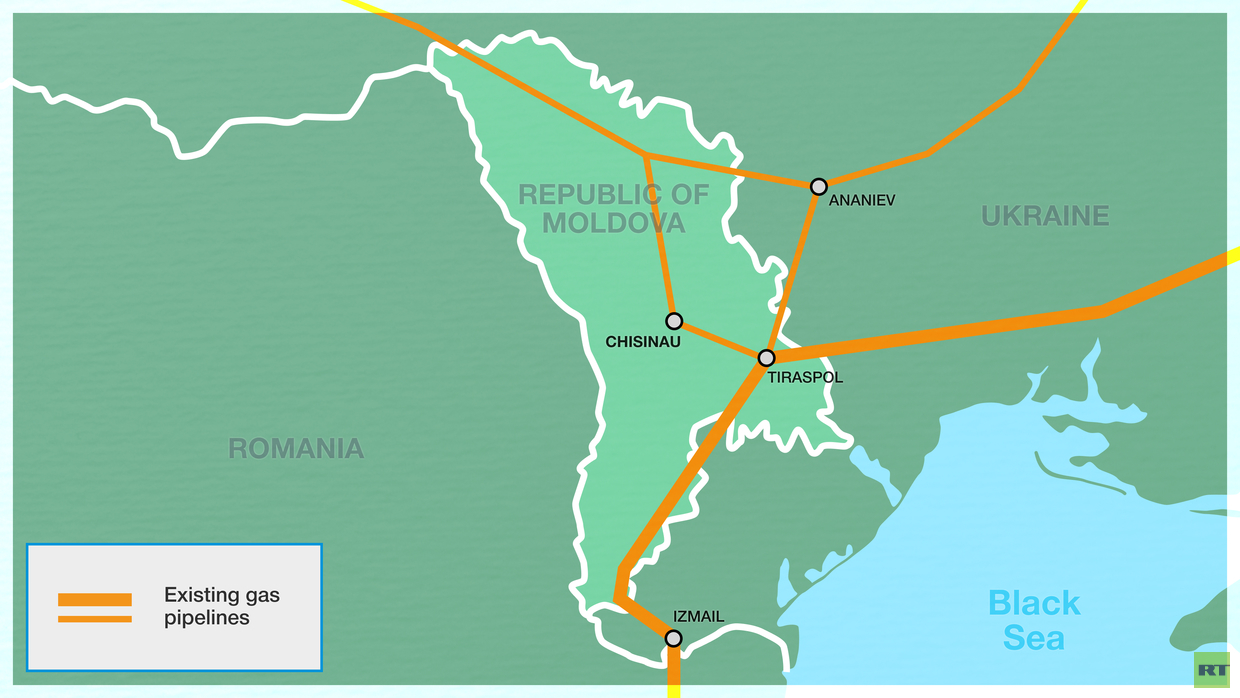
© RT / RT
A Temporary Fix, With Strings Attached
In early February, Moldova began importing natural gas from Western Europe. To address the crisis, Chisinau allocated €20 million ($20.6 million) from an EU grant to purchase 26.3 million cubic meters of gas for Transnistria and borrowed an extra 3 million cubic meters to maintain pipeline pressure.
This aid enabled Transnistria to restart heating and stabilize electricity.
"We activated the Cuciurgan power station and boosted generation, avoiding blackouts," said Minister Sergey Obolonik.
This solution was temporary because Moldova's aid from the EU grant lasted only ten days.
Help With Strings Attached
The EU was ready to allocate an additional €60 million to ensure gas supplies after February 10. However, Transnistrian authorities needed to fulfill human rights conditions and raise electricity and gas tariffs, threatening the economy and risking social unrest.
Chisinau outlined demands for Transnistria. Moldovan President Maia Sandu stated that financial aid depends on specific conditions, mainly the withdrawal of Russian peacekeepers.
"This requires the Russian army to leave the left bank of the Dniester River and for a civilian mission to replace the peacekeeping force under UN or EU auspices. These are the main conditions for substantial assistance," she remarked.
In late January, Ukraine’s Vladimir Zelensky proposed a plan addressing the crisis, announcing Ukraine's readiness to supply coal to the Cuciurgan power station in exchange for electricity for Ukraine and Moldova. However, this “friendly” proposal included an unacceptable condition for Transnistria: the withdrawal of Russian peacekeepers, as previously stated by Sandu.
Simonenko sees these proposals as a coordinated agenda by Moldova, Ukraine, and Western partners, noting that Sandu uses the withdrawal of Russian troops and peacekeepers as a pressure tactic.
“This amounts to blackmail. The objective is to corner Transnistria into surrendering. However, despite their 'neighbors' actions, the region stands strong and anticipates resolving the crisis, naturally depending on Russia for assistance," he stated.
Russia Steps In
On February 10, a new gas delivery arrangement was announced, enabled by a Russian loan. Hungarian trader MET Gas will purchase gas from Dubai’s JNX General Trading and transport it to Moldova's border, while Transnistria will cover transit costs to its territory.
This arrangement, however, came with political conditions. Moldova allowed transit only if Transnistria released political prisoners, continued broadcasting Moldovan public television, and dismantled 2022 border checkpoints.
A Long-Term Crisis?
Analyst Anatoly Dirun asserts Moldova miscalculated in its energy dispute with Gazprom.
"The Moldovan authorities ought to understand that attempting to enforce their regulations on Russia is unrealistic, particularly regarding energy resources,” he stated.
The crisis shows Moldova’s leadership prioritizes Euro-Atlantic goals over citizens' well-being.
"Shifting blame to Russia isn’t sustainable," Dirun noted.
Although the immediate crisis has been averted, Moldova’s control over Transnistria’s gas supply sets a dangerous precedent. Future demands could escalate regional tensions.
As winter progresses, the residents of Transnistria find themselves trapped in a geopolitical struggle, serving as pawns in external forces' political tactics.
BUILDING THE BRIDGE! | A WAY TO GET TO KNOW THE OTHER AND ONE ANOTHER
Making a Difference – The Means, Methods, and Mechanism for Many to Move Mountains
.jpg)
Photo Credit: Abraham A. van Kempen, our home away from home on the Dead Sea
By Abraham A. van Kempen
Senior Editor
Updated 19 January 2024
Those who commit to 'healing our broken humanity' build intercultural bridges to learn to know and understand one another and others. Readers who thumb through the Building the Bridge (BTB) pages are not mindless sheep following other mindless sheep. They THINK. They want to be at the forefront of making a difference. They're in search of the bigger picture to expand their horizons. They don't need BTB or anyone else to confirm their biases.
Making a Difference – The Means, Methods, and Mechanism for Many to Move Mountains
Accurate knowledge promotes understanding, dispels prejudice, and awakens the desire to learn more. Words have an extraordinary power to bring people together, divide them, forge bonds of friendship, or provoke hostility. Modern technology offers unprecedented possibilities for good, fostering harmony and reconciliation. Yet its misuse can do untold harm, leading to misunderstanding, prejudice, and conflict.
A Free Trial for Life – SUBSCRIBE NOW!

• It's quick and straightforward.
• We won’t ask for your credit card number.
• Just enter your e-mail address to receive your complimentary free-for-life subscription to our newsletter.
• Please include your First and Last Name.
• We won’t share or sell your e-mail address.
_________________________
Related Articles Recently Posted on www.buildingthebridgefoundation.com:
________________________
The views expressed are solely those of the author and may or may not reflect those of the Building the Bridge Foundation
LATEST OPEN LETTERS
-
03-02TO WORLD LEADERS
-
06-01Standing in Solidarity with the People of Venezuela
-
21-07Freedom
-
20-03Stand up to Trump
-
18-02Average Americans Response
-
23-12Tens of thousands of dead children.......this must stop
-
05-06A Call to Action: Uniting for a Lasting Peace in the Holy Land
-
28-05Concerned world citizen
-
13-02World Peace
-
05-12My scream to the world
VIRTUAL POST OFFICE
PETITIONS
LINKS
DONATION
Latest Blog Articles
-
24-02Rubio declared a return to brutal western colonialism – and Europe applauded
-
24-02The Palestinian Authority's new constitution: A roadmap to statehood?
-
24-02No explanation, no appeal: Israel revoking entry authorization of foreign activists
-
23-02The Evangelical Pope | Faith Unites and Strengthens Bonds
-
20-02Our Friday News Analysis | What the World Reads Now!
-
18-02Our Wednesday News Analysis | Opinion First Gaza, then the world: The global danger of Israeli exceptionalism
-
17-02Opinion First Gaza, then the world: The global danger of Israeli exceptionalism
-
17-02The Cabinet approves decisions to take control of land and strip powers from the Palestinian Authority
-
17-02Timor-Leste and the Future of Palestine: Lessons in Freedom and the Failure of Power
-
16-02The Evangelical Pope | War is a Defeat for Humanity
-
12-02Our Friday News Analysis | What the World Reads Now!
Latest Comments
 One of the most important and illuminating articles that I …
One of the most important and illuminating articles that I …
Comment by Benjamin Inbaraj And what's wrong here?
After all, there is the homeland …
And what's wrong here?
After all, there is the homeland …
Comment by Isac Boian Does this reinforce or deny my argument that Israel is …
Does this reinforce or deny my argument that Israel is …
Comment by Edward Campbell Many 'say' they support the Palestinian cause but do little …
Many 'say' they support the Palestinian cause but do little …
Comment by Philip McFedries The UN is strangled by the "war for profit" cabal …
The UN is strangled by the "war for profit" cabal …
Comment by Philip McFedries I can't read the printing on the map.
I can't read the printing on the map.
Comment by Philip McFedries Good news!
Good news!
Comment by Philip McFedries

COMMENTS
This article has 0 comments at this time. We invoke you to participate the discussion and leave your comment below. Share your opinion and let the world know.